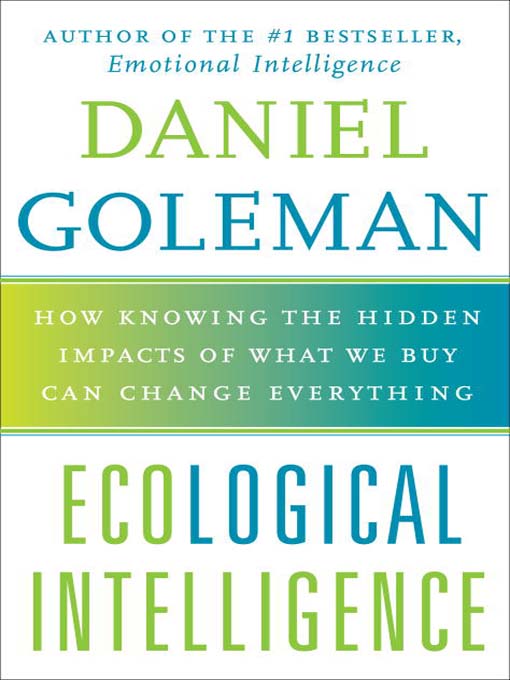
Ecological Intelligence
How Knowing the Hidden Impacts of What We Buy Can Change Everything
کتاب های مرتبط
- اطلاعات
- نقد و بررسی
- دیدگاه کاربران
نقد و بررسی

February 23, 2009
Two years ago, British fashion designer Anna Hindmarch produced the must-have accessory of the season: a bleached, organic cotton tote manufactured in fair-wage factories, subsidized with carbon offsets and emblazoned with the slogan, “I'm NOT a plastic bag.” But according to Goleman (Emotional Intelligence
), the people who bought the bag were advertising their ecological ignorance, not their consciousness. In this thorough examination of the inconsistencies and delusions at the core of the “going green effort,” the author argues that consumers are “collective victims of a sleight of hand,” helplessly unaware of the true provenance and impact of the products they purchase: they reassure themselves by buying “environmentally friendly” tote bags that, upon ecological assessment, reveal some uncomfortable facts, e.g., 10,000 liters of water were required to grow the cotton for one bag, and cotton crops alone account for the use of about 10% of the world's pesticides. Goleman's critiques are scathing, but his conclusion is heartening: a new generation of industrial ecologists is mapping the exact impact of every production process, which could challenge consumers to change their behavior in substance rather than just show.

February 15, 2009
Radical transparency about a product's origin, manufacture and distribution is the key to green consumerism.
So argues New York Times science reporter Goleman (Social Intelligence: The New Science of Human Relationships, 2007, etc.). Today's shoppers are bombarded by"greenwashing," he writes. The decision to buy a certain product—an organic apple, for example—is often based on a single eco-friendly aspect and ignorant of the other factors associated with the apple's growing, harvesting, packaging and shipping. Because every link in the supply chain affects every other, Goleman notes, only true transparency about a product's journey to the shelf can lead consumers to change their shopping habits in ways that will have positive effects on the environment, their health and global business practices. Recent polls have shown that people are willing to pay a premium for merchandise they know is free of toxic chemicals or wasn't manufactured using child labor. Several prototype systems compile the results of comprehensive research into a simple product-rating system. Armed with this information, shoppers will be able to choose the items that are most eco-friendly and thus help dictate how companies run their businesses. As an example of such a consumer-driven change, the author offers the recent nationwide removal of trans fats from foods, prompted by customer demand. Such ongoing shifts in shopping habits could force corporations across the world to re-evaluate the debate that"pits doing good against doing well," which has historically driven executives to choose their bottom line over ecological responsibility. Over time, Goleman believes, reducing dependence on petroleum and cheap chemical additives will prove to be a profitable practice, which in turn will enable ecologically friendly products to sell at reasonable price points. Dramatic shifts like these reveal the latent"people power" of the free market, avers the author, backing up each argument with well-crafted field support from industrial ecologists, ecologically minded CEOs, toxicologists and other experts.
A convincing case that information alone—provided that it's easy for shoppers to access—can spur an ecological revolution.
(COPYRIGHT (2009) KIRKUS REVIEWS/NIELSEN BUSINESS MEDIA, INC. ALL RIGHTS RESERVED.)

March 15, 2009
Former "New York Times" columnist Goleman ("Emotional Intelligence") contends that to address environmental challenges, we must rethink our industrial legacy, reform manufacturing and commerce, and improve our collective ecological footprint. In essence, he asserts that collective consumerism is central to environmental action. He discusses the process of life-cycle analysis to determine a product's environmental impact but maintains it does not go far enough. He persuasively argues that radical transparencywhich includes environmental, social, biological, and worker safety and health impactswill better enable consumers to make decisions based on what matters most to them. Goleman's discussion of individual shopping habits is particularly interesting, including the need to be aware of superficial service and product claims"greenwashing." Although individual decisions are important, he asserts that group action and institutions can create market pressure to shift to sustainable practices and that digital tools can play an effective role in shaping collective awareness and creating coordinated action. Recommended for readers interested in business or environmental issues. [For more on business and the environment, see Robert Eagan's collection development article, "The Green Capitalist," "LJ" 2/1/09, p. 37-39.Ed.]Robin K. Dillow, Rotary International, Lincolnwood, IL
Copyright 2009 Library Journal, LLC Used with permission.

Starred review from February 15, 2009
Goleman, best-selling author of such groundbreaking works as Emotional Intelligence (1995) and Primal Leadership (2002), brings his invaluable behavioral insights to our most urgent dilemma: how to halt environmental catastrophe. Whats required, Goleman believes, is ecological intelligence, which he defines as understanding the hidden web of connections between human activity and natures systems, and the subtle complexities of their intersections. More concretely, Goleman encourages readers to learn about the many invisible threats to our health and the health of the environment caused by product manufacturing. Wisely focusing on the one element we can control, what we purchase, Goleman calls for higher green standards and radical transparency regarding how products are made. An enlightening foray into industrial ecology reveals how new forms of analysis determine precisely how the manufacture of such disparate items as toys, shampoo, and paper contributes to natural resource depletion, chemical pollution, and global warming. Brimming with intriguing, useful, and galvanizing information, this is an exceptionally sharp, innovative, and realistic approach to raising the demand for environmentally safe merchandise. Given Golemans track record and the pressing need for smart strategies, this fascinating treatise has tremendous potential for reaching and motivating a large and diverse audience.(Reprinted with permission of Booklist, copyright 2009, American Library Association.)

























دیدگاه کاربران